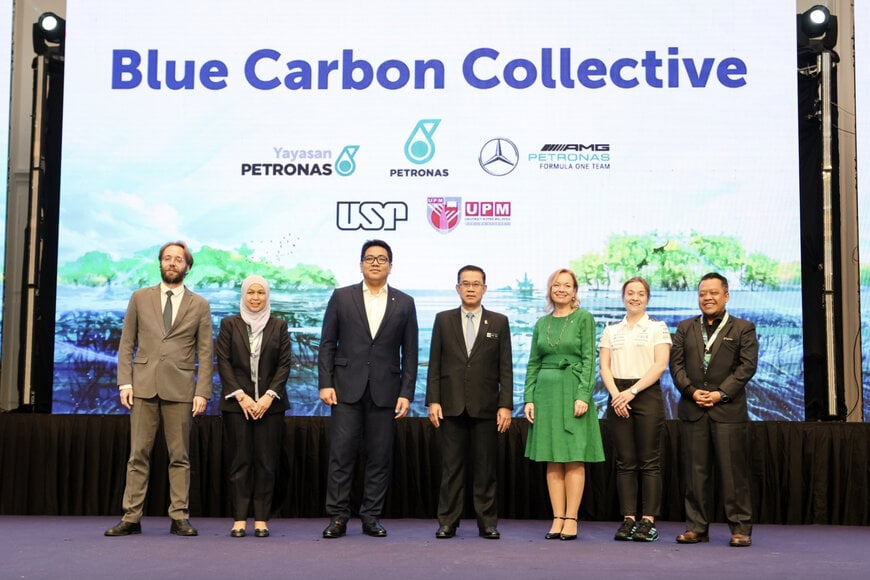www.industry-asia-pacific.com
16
'25
Written on Modified on
PETRONAS and Mercedes-AMG PETRONAS F1 Team Announce Collaboration
The five-year collaboration is expected to generate vital research data to advance carbon emissions reduction strategies, help conserve mangroves, and create local job and business opportunities.
uk.pli-petronas.com

PETRONAS and the Mercedes-AMG PETRONAS F1 Team will be collaborating to launch the Blue Carbon Collective, a South-South research initiative that aims to advance research and knowledge exchange on carbon capture and storage in mangrove ecosystems. The Collective will build upon the ongoing cooperation between the University of São Paulo (USP) and Universiti Putra Malaysia (UPM), fostering collaboration and resource sharing between two countries in the southern hemisphere – Malaysia and Brazil.
The five-year collaboration is expected to generate vital research data to advance carbon emissions reduction strategies, help conserve mangroves, and create local job and business opportunities. The Mercedes-AMG PETRONAS F1 Team will support the research activities, reflecting their commitment to raising environmental awareness.
The Blue Carbon Collective also supports Yayasan PETRONAS’ One Million Trees Programme – an ecosystem restoration and community development initiative that will see 100,000 mangrove trees planted in the Sungai Santi Forest Reserve in Johor, Malaysia, to rehabilitate degraded areas. To date, 20,000 mangrove seedlings have been planted by the local communities.
The ongoing cooperation between USP and UPM will support UPM to conduct research in the Sungai Santi Forest Reserve and apply established methodologies from Brazil. These include carbon stock assessment and monitoring of soil quality and ecosystem health in Malaysia, enabling comparative analysis between the two countries.
The Blue Carbon Collective aims to deliver several research objectives including identifying the impact of land use changes, understanding carbon stabilisation mechanisms, and developing and applying a soil quality index.
The initiative aligns with PETRONAS’ Sustainability Approach, particularly the pillars of Thriving with Nature, which promotes ecosystem restoration and conservation, and Fostering a Just Transition, which supports equitable opportunities for local communities. This initiative also reinforces and strengthens the sustainability intent of the partnership between PETRONAS and the Mercedes-AMG PETRONAS F1 Team, not only on the racetrack but also off the track towards achieving our shared net zero ambitions.
PETRONAS announces first nature and resource efficiency targets
PETRONAS also announced its first targets for nature and resource efficiency at the Energy and Nature Forum, marking a landmark moment for the company in streamlining its efforts biodiversity conservation and even more responsible use of natural resources in Malaysia and in communities where PETRONAS conducts operations.
These targets for nature are:
1. No net loss of biodiversity for existing operations
- By 2030, PETRONAS aims to have Biodiversity Action Plans for all existing sites within their operational control rated ‘very high’ or ‘high’ risks, which include measures for ecosystem rehabilitation.
- From 2030, PETRONAS aims to maintain the habitat size for all sites within their operational control located in protected areas and/or key biodiversity areas. Where not feasible, PETRONAS establishes comparable areas to substitute the loss.
- From 2030, PETRONAS’ decommissioning plans or equivalent documents, will include ecosystem rehabilitation measures for operations/projects in protected areas and/or key biodiversity areas.
2. Net positive impact on biodiversity for new projects
From 2024, PETRONAS aims to demonstrate Net Positive Impact for all new projects in protected areas and/or key biodiversity areas. For these projects, by 2050, PETRONAS pledges to demonstrate at least 30% rehabilitation of natural habitat.
The targets for resource efficiency are:
From 2024, PETRONAS aims to demonstrate Net Positive Impact for all new projects in protected areas and/or key biodiversity areas. For these projects, by 2050, PETRONAS pledges to demonstrate at least 30% rehabilitation of natural habitat.
The targets for resource efficiency are:
- PETRONAS will aim to reduce its freshwater withdrawal for its domestic operations at existing water-stressed areas by 14% by 2030 using 2021 as baseline.
- PETRONAS will aim to achieve a circularity rate of 82% for hazardous waste at its domestic operations by 2030.

